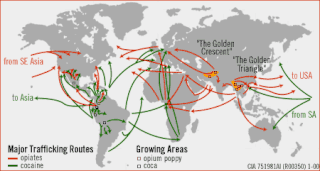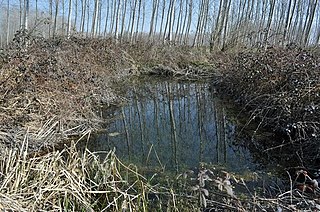
Cannabis is legal for medical and industrial purposes in Albania.

Cannabis is legal for medical and industrial purposes in Albania.
Drug trafficking first became a major concern in Albania in the 1990s; in that same period cannabis cultivation which had initially been concentrated in the south became more widespread. Albanian cannabis production is sufficient to meet local demand and also export to other areas, though the country continues to import some hashish through Turkey. [1]
In the mid-2000s, 77% of the cannabis in Italy originated in Albania. [2] A 2009 report, however, noticed a reduction in the significance of Albanian cannabis exports, and that seizures of Albanian herbal cannabis had "become very rare in the last five years." [3]
More recently, although still undoubtedly a net exporter, Albanians have begun importing herbal cannabis as well, with an apparent preference for the hashish varieties of the Maghreb. Total production, meanwhile, in Albania, was estimated by Italian financial police to be around 900 tonnes, worth about 4.5 billion euros. [4]
In 2012, Albania seized 21.2 metric tons of cannabis, nearly twice the amount seized in 2011. [5]
Albania made global headlines and "placed itself on the cannabis map" in 2013 when the Albanian State Police (ASP) tried to shut down production in Lazarat, one of the heaviest producing towns in the mountainous southern regions that are said to be the "heartland" of Albanian cannabis production. Lazarat's villages, 90% of whom are thought to be involved in the cannabis trade in some way, mounted an armed resistance against the ASP with even a "70-year old grandmother" involved in the fighting. [4]
It was right after the fall of its communist state that the current large production of cannabis began in Albania. In 1991, criminal groups from Greece began to establish cannabis plantations in southern areas near the Greek border, and the local Albanian farmers embraced an opportunity for some level of financial stability in the turbulent economic situation. In the early days of cannabis production in Albania, trafficking was done by Greek youths who carried bags of cannabis over the mountains across the border, in which Albanian law enforcement found it difficult to control the trade. The new industry took hold quickly despite attempts to curtail it, and it has been reported that in 1995 gunfights between farmers and police were common. Later on, the trade became linked to the Italian mafia, and cannabis was carried to Italy on speedboats going over the Ionian Sea. [4]
Due to its aspirations to join the European Union, Albania is under pressure to present a decisive national anti-drug strategy, and in recent years has escalated police crackdown against the cannabis trade, with mixed results, and coordinating efforts with other national governments such as the Italian government. [4]
On 7 April 2022 after a vote of the national counselling with 61% of people being in favor of legalization, prime minister Edi Rama announced he will pave the way for the legalization of medical cannabis. [6]
On 21 July 2023 the Albanian Parliament voted 69-23 to legalize medical cannabis. [7]

Hashish, commonly shortened to hash, is an oleoresin made by compressing and processing parts of the cannabis plant, typically focusing on flowering buds containing the most trichomes. It is consumed as a narcotic by smoking, typically in a pipe, bong, vaporizer or joint, or via oral ingestion. Hash has a long history of usage in countries such as Afghanistan, Morocco, Egypt, Pakistan, India, Nepal, Iran, and Lebanon. Hash consumption is also popular in Europe. In the United States, dried flowers or concentrates are more popular, though hash has seen a rise in popularity following changes in law. Like many recreational drugs, multiple synonyms and alternative names for hash exist, and vary greatly depending on the country and native language.

The prohibition of drugs through sumptuary legislation or religious law is a common means of attempting to prevent the recreational use of certain intoxicating substances.

The illegal drug trade or drug trafficking is a global black market dedicated to the cultivation, manufacture, distribution and sale of prohibited drugs. Most jurisdictions prohibit trade, except under license, of many types of drugs through the use of drug prohibition laws. The think tank Global Financial Integrity's Transnational Crime and the Developing World report estimates the size of the global illicit drug market between US$426 and US$652 billion in 2014 alone. With a world GDP of US$78 trillion in the same year, the illegal drug trade may be estimated as nearly 1% of total global trade. Consumption of illegal drugs is widespread globally and it remains very difficult for local authorities to reduce the rates of drug consumption.

Narco-state is a political and economic term applied to countries where all legitimate institutions become penetrated by the power and wealth of the illegal drug trade. The term was first used to describe Bolivia following the 1980 coup of Luis García Meza which was seen to be primarily financed with the help of narcotics traffickers. Other well-known examples are Honduras, Guinea-Bissau, Mexico, Myanmar and Syria, where drug cartels produce, ship and sell drugs such as captagon, cocaine, heroin and marijuana.
The expression International Opium Convention refers either to the first International Opium Convention signed at The Hague in 1912, or to the second International Opium Convention signed at Geneva in 1925.

Fenethylline is a codrug of amphetamine and theophylline and a prodrug to both. It is also spelled phenethylline and fenetylline (INN); other names for it are amphetamin
A drug policy is the policy regarding the control and regulation of psychoactive substances, particularly those that are addictive or cause physical and mental dependence. While drug policies are generally implemented by governments, entities at all levels may have specific policies related to drugs.

Agriculture in Morocco employs about 40% of the nation's workforce. Thus, it is the largest employer in the country. In the rainy sections of the northwest, barley, wheat, and other cereals can be raised without irrigation. On the Atlantic coast, where there are extensive plains, olives, citrus fruits, and wine grapes are grown, largely with water supplied by artesian wells. Livestock are raised and forests yield cork, cabinet wood, and building materials. Part of the maritime population fishes for its livelihood. Agadir, Essaouira, El Jadida, and Larache are among the important fishing harbors. Both the agriculture and fishing industries are expected to be severely impacted by climate change.
Saimir Tahiri is an Albanian politician, who served as the Minister of Interior Affairs in the government of Prime Minister Edi Rama from 2013 to 2017.

Cannabis in Morocco had been illegal since the nation's independence in 1956, reaffirmed by a total ban on drugs in 1974, but was partially tolerated in the country. Cannabis has been cultivated in Morocco for centuries and the country is currently among the world's top producers of hashish. As of 2016, Morocco was the world's top supplier of cannabis. On May 26, 2021, the Moroccan parliament voted to legalize the use of cannabis for medical, as well as cosmetic and industrial purposes.

Cannabis in France is illegal for personal use, but remains one of the most popular illegal drugs. Limited types of cannabis-derived products are permitted for medical uses.

Cannabis in Washington relates to a number of legislative, legal, and cultural events surrounding the use of cannabis. On December 6, 2012, Washington became the first U.S. state to legalize recreational use of marijuana and the first to allow recreational marijuana sales, alongside Colorado. The state had previously legalized medical marijuana in 1998. Under state law, cannabis is legal for medical purposes and for any purpose by adults over 21.

Cannabis in Nepal has been illegal since 1976, but the country has a long history of use of cannabis for Ayurvedic medicine, intoxicant and as a holy offering for Hindu god Shiva and continues to produce cannabis illicitly.
Cannabis in Greece is illegal for recreational purposes. In 2017, the Greek government legalized the use of cannabis for medical purposes, and a year later, they lifted the ban on growing or producing it. This enables pharmaceutical companies to grow cannabis legally, and industrial hemp suppliers too.

Cannabis in Indonesia is illegal. Cannabis plants, all plants of the Cannabis genus and all parts of plants including seeds, fruit, straw, and processed cannabis plants or parts of cannabis plants including marijuana resin and hash are categorized as narcotics group. Drug offenders are subject to a minimum sentence of four years in prison if caught possessing it. Derivatives of medical and recreational cannabis are also illegal.

The cultivation of cannabis in Italy has a long history dating back to Roman times, when it was primarily used to produce hemp ropes, although pollen records from core samples show that Cannabaceae plants were present in the Italian peninsula since at least the Late Pleistocene, while the earliest evidence of their use dates back to the Bronze Age. The mass cultivation of industrial cannabis for the production of hemp fiber in Italy really took off during the period of the Maritime Republics and the Age of Sail, and continued well after the Italian Unification, only to experience a sudden decline during the second half of the 20th century, with the introduction of synthetic fibers and the start of the war on drugs, and only recently it is slowly experiencing a resurgence.

Cannabis is illegal for cultivation, trade and personal use in Lebanon. Nevertheless, large amounts of cannabis are grown illegally within the country, especially in the Bekka Valley, and consumed for personal use in private.
Cannabis in Sri Lanka is legally sold through Ayurveda herbal shops, and can be used for medical and scientific purposes if given a license by the Ministry of Health. For recreational usage cannabis is not legal.
The list includes and details significant events that occurred in the global history of national-level implementations of, or changes made to, laws surrounding the use, sale, or production of the psychoactive drug cannabis.

On 16 June 2014, around 800 heavily armed Albanian police officers began a large scale raid in the mountain village of Lazarat, targeting cannabis growers, as part of a nation-wide operation to quell illegal cannabis plantations. Armed drug gang members responded with fire from automatic rifles, RPG-7s and mortars. After a four-day siege, the police captured Lazarat and its surrounding fields. Fourteen villagers and mafiosos were arrested. No fatalities were reported. Following the capture of the village, the police destroyed around 91,000 cannabis plants.